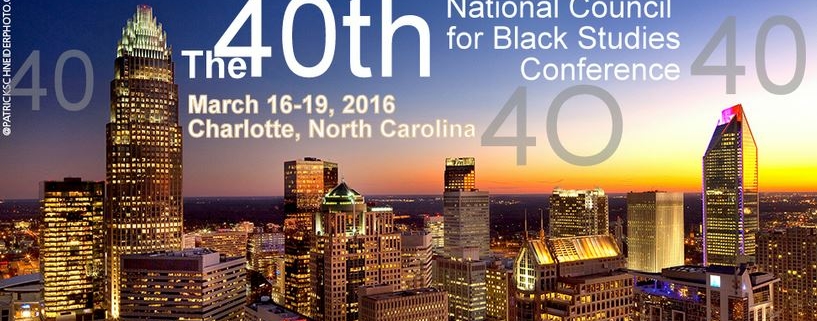
All abstracts must be submitted online no later than January 15, 2016.
On the heels of the establishment of the first generation of Black Studies departments and programs across the United States, starting from 1968, the University of North Carolina at Charlotte hosted a conference of Black Studies scholars in March 1975 to create a national organization that would help guide the standardization of the curriculum, mission, and the accreditation of Black Studies academic units. It was from that meeting that the National Council for Black Studies was created in July 1975. Forty years later, the field of Black Studies has grown into a formidable discipline and field of study with more than 200 degree programs at the Undergraduate, Master’s and Doctoral levels in the United States alone. The 2016 conference of the National Council for Black Studies offers a critical juncture to reflect on the difficulties and accomplishments that have accompanied the institutionalization of Black Studies in the academy, as well as the new opportunities and emerging challenges that deserve the attention of scholars, activists, and policy makers regarding the condition of black people globally.
Participants are invited to present new theoretical and empirical studies as well as new models of practice and social activism on a wide range of topics that deal with the Black experience globally and across time. The NCBS, therefore, invites abstracts for individual papers, panels, posters, roundtable discussions, and workshops on various aspects of Black Studies that are informed by historical and social science analyses, arts and literary criticism, philosophical reflections, and spiritual interventions, among others, especially as these may relate to the issues of race, migration, citizenship, social justice, Pan-Africanism, environmental and social sustainability, globalization, diaspora formations, development and economic empowerment, moral economy, community formation, sexuality, and gender. We welcome you to submit abstracts that explore transnational, transcultural, transgendered approaches; studies that are place or region specific; as well those that explore the questions of modernity and the challenges of its “post” manifestations and reifications such as postcoloniality, postmodernity, and postraciality.
You are encouraged to dig deep into the intellectual history of Africana Studies and use this background to formulate inter-generational and inter-geographic theories about the black experience. We are also looking for studies that amplify and challenge seemingly centered and settled perspectives in order to explore new directions in Black Studies. For example, what does it mean to be Africa-centered in the 21st century in the face of the new media, digital revolution, and hyper-globalization? What pedagogical tools make Black Studies necessary for developing a culture-conscious and history-literate global citizenry? What new insights do we offer for creating a just world? How do we develop frameworks of multi-tiered social responsibility at the individual, family, community, national, corporate, and multinational levels for sustainable and ethical solutions to the challenges of racism, mass incarceration, poverty, political apathy, and anti-black violence? We seek to develop a conference program that defines the global black presence in accordance with the original Pan-African vision of Black Studies.
Hence, scholars working on the black experience in North America, the Caribbean, Latin America, Africa, Europe, Australia and Asia are invited to submit abstracts. Interested participants, established and emerging scholars, students and social activists, should send an abstract of no less than 75 – 250 words for a panel (one for the panel subject and one for each panelist), and/or individual paper and poster presentations.
For round-table discussions and workshop, please submit a 75-250 word abstract.
For more information visist: http://www.ncbsonline.org/




